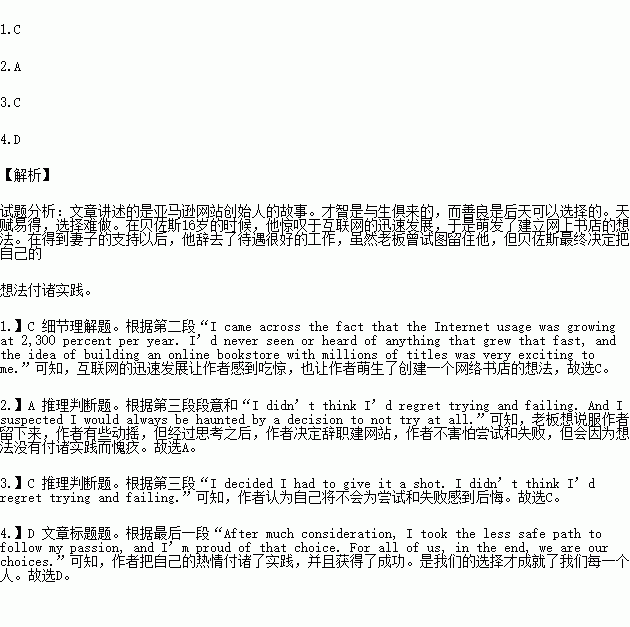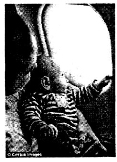题目内容
Cleverness is a gift while kindness is a choice. Gifts are easy – they’re given after all. Choices can be hard.
I got the idea to start Amazon 16 years ago. I came across the fact that the Internet usage was growing at 2,300 percent per year. I’d never seen or heard of anything that grew that fast, and the idea of building an online bookstore with millions of titles was very exciting to me. I had just turned 30 years old, and I’d been married for a year. I told my wife MacKenzie that I wanted to quit my job and go to do this crazy thing that probably wouldn’t work since most start-ups don’t, and I wasn’t sure what to expect. MacKenzie told me I should go for it. As a young boy, I’d been a garage inventor. I’d always wanted to be an inventor, and she wanted me to follow my passion.
I was working at a financial firm in New York City with a bunch of very smart people, and I had a brilliant boss that I much admired. I went to my boss and told him I wanted to start a company selling books on the Internet. He took me on a long walk in Central Park, listened carefully to me, and finally said, “That sounds like a really good idea, but it would be an even better idea for someone who didn’t already have a good job.” That logic made some sense to me, and he convinced me to think about it for 48 hours before making a final decision. Seen in that light, it really was a difficult choice, but finally, I decided I had to give it a shot. I didn’t think I’d regret trying and failing. And I suspected I would always be haunted by a decision not to try at all.
After much consideration, I took the less safe path to follow my passion, and I’m proud of that choice. For all of us, in the end, we are our choices.
1.What inspired the author with the idea of building an online bookstore?
A. His dream of being an inventor.
B. The support of his wife.
C. The greatly increasing usage of the Internet.
D. Millions of exciting titles.
2.Which of the following is closest in meaning to the underlined sentence?
A. The idea of not trying would keep coming to his mind and disturb him.
B. He would be very excited if he tried it out.
C. He would be always having a doubt if he didn’t try.
D. The decision not to try the online bookstore would terrify him.
3.We can know from the passage that _______.
A. the boss thought the idea was suitable for the author
B. the author wanted someone else to try the idea
C. the author might not regret if he failed the idea
D. the author might go back to his boss if he failed
4.Which of the following would be the best title for the passage?
A. Cleverness and Kindness B. The Starting of Amazon
C. Following My Passion D. We Are What We Choose


